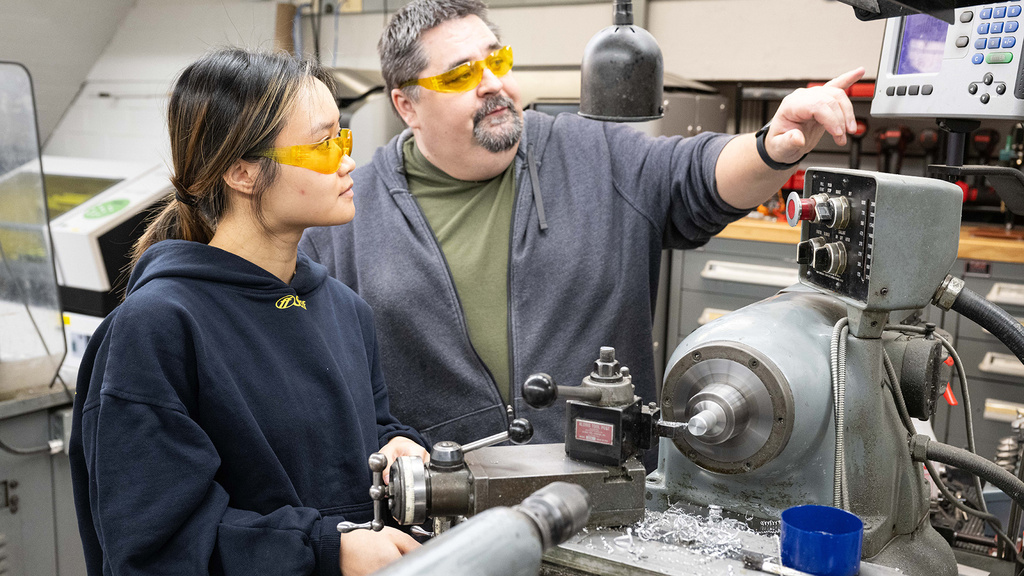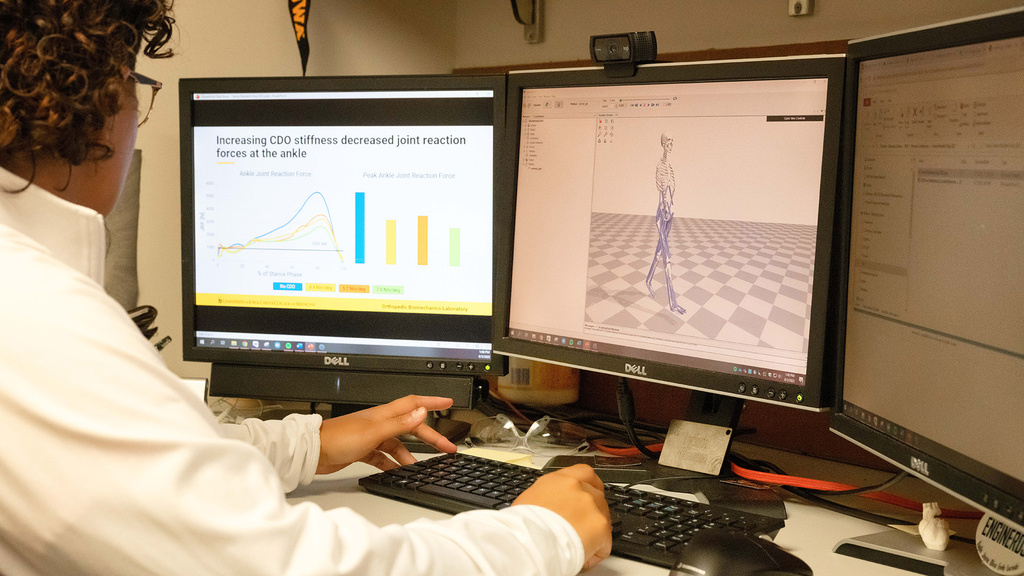If you’re passionate about both medicine and technology, choosing a biomedical engineering degree might feel like the perfect fusion. But what if your long-term goal is medical school? The good news is that a biomedical engineering degree not only supports that goal, but it can also enhance it.
Most medical schools require coursework in biology, chemistry (general and organic), physics, calculus, and English. A biomedical engineering curriculum meets — and often exceeds — med school requirements, especially with guidance from your advisor.
At the University of Iowa, for example, biomedical engineering students can tailor their elective courses to include prerequisites such as:
- General and organic chemistry with lab
- Biology and cell biology
- Physics I and II
- Calculus I and II
- English composition
With careful academic planning, you can complete your degree and be fully prepared to apply to med school. Additionally, one of the strengths of a biomedical engineering background is that engineering trains you to think like a problem solver. Engineering courses focus on systems thinking, data analysis, and innovation — skills highly valued in modern medicine.
Doctors are increasingly expected to evaluate new medical technologies, interpret complex data, and contribute to clinical research. Biomedical engineering students graduate with hands-on experience in areas such as biomechanics, medical imaging, and tissue engineering, which can make them uniquely equipped to tackle medical challenges from both scientific and humanistic perspectives.
Academic advisors work closely with students pursuing biomedical engineering who are also considering medical school. They help you balance core engineering courses with med school prerequisites, plan for the MCAT, and gain clinical or research experience.
Through Iowa’s advising system, students receive support in:
- Selecting electives that fulfill both biomedical engineering and pre-med requirements
- Identifying internships or lab opportunities
- Planning a timeline for medical school applications
This dual support structure ensures that you don’t have to choose between preparing for a career in engineering or medicine — you can position yourself for both.
Do you have to go to med school to be a biomedical engineer?
Not at all.
In fact, no country requires a medical degree to become a biomedical engineer. That said, the educational and regulatory requirements can vary significantly depending on the country and the specific area within biomedical engineering you want to work in. For those designing or working with implantable/surgical devices, deep collaboration with medical professionals is essential — and having dual degrees can be advantageous.
While biomedical engineering is a great pre-med major, it also can lead directly to other impactful careers in health care and technology, ones that don’t require an MD.
For example, many biomedical engineering graduates go on to:
- Work in industry roles, such as designing prosthetics, medical devices, or diagnostics
- Pursue research careers, often at universities, hospitals, or private labs
- Enroll in graduate engineering programs to specialize further in areas such as bioinformatics, biomaterials, or neural engineering
So, if your interests lean more toward design and innovation than clinical practice, a biomedical engineering degree can still lead to a fulfilling and well-compensated career without medical school.

Is biomedical engineering harder than medicine?
This is a common question. The answer depends on your personal strengths and career goals.
Biomedical engineering is known for its technical rigor. You’ll dive into advanced math, physics, and design projects, all while learning how to apply these principles to living systems. On the other hand, medicine often requires extensive memorization, clinical judgment, and interpersonal skills.
In short:
- Engineering challenges your quantitative and analytical abilities
- Medicine demands strong memory, empathy, and diagnostic reasoning
Neither is objectively harder. They’re just hard in different ways. Think about whether you thrive more in abstract problem-solving or in hands-on human interaction.
Kelsey Lyons, a student at Georgetown University School of Medicine, says her time as a biomedical engineering major at the University of Iowa gave her a strong foundation.
“Memorization has never been my strength, but my biomedical engineering background really solidified my ability to solve problems,” says Lyons, who earned a BSE in 2022. “Applying what we learn comes down to being able to synthesize a lot of information to come up with solutions. I got so much practice with that as a biomedical engineer.”
That ability to think critically and tackle complex challenges is exactly what medical schools look for, especially when paired with strong communication, says Amy A’Hearn, assistant director of admissions at the University of Iowa Carver College of Medicine.
“Being able to articulate how you worked in teams to solve problems in your biomedical engineering classes will be helpful for admissions committees to understand,” she says. “Our goal is to build a well-balanced class with thinkers of all kinds, so biomedical engineering applicants who can clearly express how their analytical minds can help solve problems are well served.”
So, it’s not just about surviving tough classes. If you can talk about how you worked with others, solved real problems, and used your engineering brain in meaningful ways, you’re not just a strong applicant — you stand out.

Do biomedical engineers earn more than doctors?
When it comes to compensation, both paths offer competitive salaries, but doctors typically earn more — especially after years of training.
Here’s a quick comparison:
- Biomedical engineers: According to the U.S. Bureau of Labor Statistics, the median annual wage is about $106,000, with variation based on industry and specialization.
- Physicians and surgeons: Salaries vary widely depending on specialty and location, but general practitioners can earn $200,000 or more, while specialists such as surgeons or anesthesiologists can earn $300,000+ annually.
It’s worth noting that becoming a doctor usually involves four years of medical school and three to seven years of residency — and often comes with significant student debt. Biomedical engineers can begin working right after their bachelor’s or master’s degree, which may appeal to students wanting a quicker entry into the workforce.
Which path is right for you — medicine or biomedical engineering?
Ultimately, the decision comes down to what excites you most. Do you want to care for patients and diagnose illnesses, or would you rather design the next generation of pacemakers and imaging systems?
To help you decide:
- Reflect on what energizes you: Do you like solving equations or caring for people?
- Consider how much time and money you’re willing to invest in your education.
- Think long-term: What kind of day-to-day work do you envision?
Jacklyn Engelbart, who graduated from Iowa with a BSE in biomedical engineering in 2014, an MD in 2018, and an MS in clinical investigation in 2022, is now in a surgery fellowship at the University of Michigan.
“While I chose the medicine path, I’m getting the best of two worlds,” she says. “As a surgeon, I can address people’s health needs in a very direct way. I will also have collaborative opportunities with people in the medical device industry. Surgeons and engineers working together will keep our field moving forward, offering our patients the best care.”
Related content

Biomedical engineering degree types: What degree is right for you?

Is a master's degree in biomedical engineering worth it?

